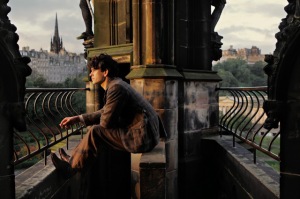Tagged: James D’Arcy
‘Cloud Atlas’ Review
‘No matter what you do it will never amount to anything more than a single drop in a limitless ocean.
What is an ocean but a multitude of drops?’
Many months ago, I saw an interview with Tom Hanks concerning this film. He spoke of its connecting stories and interesting characters. From that moment on, I really wanted to see this film. I went to the cinema with bated breath, but did this movie live up to my expectations?
Firstly, the premise of the whole film is one a unique nature. The inter-twining stories provide Cloud Atlas with a groundwork for a potentially great film. The ease in which the stories slide between each other is very clever, but, at times, leave the audience somewhat bemused. Nevertheless, they all contain different characters, genres and themes, but, simultaneously, all contain similar events: not the events themselves, rather the nature of them. For example, if one story contains an emotional converse, so does at least a few of the fellow stories (at the same time in the film). If one story contains danger, another contains a threat also. The fact that all of the stories where directed by three different people is all the more startling: it is bearly noticeable as the film slides between at least 3 stories at an given time effortlessly.
The first story (chronologically) is about a young lawyer who supposedly catches a deadly worm, which he fights of through the entirety of the film, whilst also attempting to save a stowaway: a slave who attempts to escape. The story’s main protagonist is played by Jim Sturgess, who gives a captivating performance of a ambitious yet naive young man. I really enjoyed his performance in this and thought he fit the part perfectly and of all of his other characters too. His youthful presence brought a refreshing contrast to that of Tom Hank’s evil character in this particular story. Next is a tale of an, also youthful, composer who eventually writes the Cloud Atlas sextet. This is a running motif throughout and can be heard all the way through the film, subtly placed in nearly all of the stories. For example, the melody is heard in the diner ‘Papa Song’ set may years later. Ben Whishaw plays the aspiring musician who falls deeply in love; his charming performance quickly induces pity in the audience throughout his sad story of love and fame. Subsequently, in another story, Halle Berry plays a stubborn journalist who attempts to uncover the secrets of a shady oil company. She has a great on stage presence which quickly shows the audience there is a tough woman behind her looks. She adapts wonderfully to her various roles, something which all of her fellow characters do well also. Years later, Jim Broadbent plays a publisher who has lost his way, which adds a comic twist to the film. His story is of troubled writer who gets locked into a care home with the monstrous nurse played by Hugo Weaving. Weaving plays, constantly, the villains in the tales: he uses his chilling voice and demeanour to spook the audience in nearly every one of the stories. Much like V for Vendetta and The Matrix, Weaving presence strikes fear into the onscreen characters, thorough a multitude of characters. Jumping forward once again, I was impressed by Donna Bee’s portrayal of a waitress in the future called Tilda, who transforms into the leader of the rebellion. The audience empathise with her weak nature, but she quickly becomes this brave revolutionary. Audiences are also drawn to the interrogator who is played by James D’Arcy, an actor I was also impressed with. We see him as a cold, hard questioner who begins to relate to Tilda by the end. But we also see him in the very different role of Whishaw’s character’s lover: a complete contrast in roles, both of which he executes with precision and grace. The only tale with a clear weakness is the one set the furthest in the future, in Hawaii: It’s use of supposedly archaic language leaves the audience constantly asking ‘What did he just say?’. Nevertheless, it is pivotal to the plot and must be included. This particular tale sees Hugh Grant as a flesh eating bandit who terrorises Hank’s village. Bit different to Love Actually.

Wishaw in the idyllic setting of Scotland, contrasting greatly to the futuristic one in Tilda’s story.
The choice to use the same actors for different characters has drawbacks and advantages. Firstly, this technique does show how the characters, through time, can possess good and bad traits. Although, they are not actually connected, it does signify that similar people can be evil or pure. Tom Hanks in the 1849 sailor’s tale is poisoning the protagonist, whereas in his futuristic Hawaii adventure, he is the old, wise hero. On the other hand, a drawback is the constant baffling nature of the film. Instead of thinking ‘which other film are they in?’, I started to think ‘what other part of the film are they in?’. The film’s constant game of ‘Guess who’ becomes tiring and confusing by the end, especially when the characters switch from being old to younger and vice versa. Overall, this technique, although at times confusing, is unique and adds to the film’s range of qualities.
Unique as it is, the separate tales are, largely, nothing new. The premise for nearly all the stories are a struggling young protagonist who overcomes a certain tribulation to eventual success and achievement of their goals. Obviously, all the tales do not stick to this formula strictly, but do usually follow this pattern. The audience are presented with a wealth of information which loosely relates, whilst keeping into the same criteria. This could be seen as a weakness, but on the upside it does highlight the earlier motif: across time, certain people face similar stories and overcome them in their own way. It also comforts the audience by showing that nothing that anyone does, has not been done before, reminiscent of Tom Stoppard’s Arcadia.
Overall, this film is defiantly worth a watch. I exited the cinema feeling somewhat underwhelmed, as I thought that all of the stories would somehow connect perfectly into one huge tale: this doesn’t happen. Instead you are faced with similar stories, with similar actors and with similar story lines. But perhaps that is the beauty of it. Just like real life, tales do not necessarily connect but everyone can relate to certain events. Once I came to terms with that, I started to understand the film. Don’t think that all the stories connect, even though some do. Rather take it as it is: treat the stories as separate and it all starts to fit together. Once I stopped over thinking the separate tales and how they relate to each other, I could appreciate each story for what it was. Although the stories loosely relate, they share the overriding theme being that however small or great your actions, it can echo in eternity: this is the one main motif which links all the stories together and is personified in the birthmark a lot of the protagonists possess. I did enjoy it, but I felt it was nothing new. Cloud Atlas’s cast really make the film and the vivid yet contrasting settings are very powerful. The lack of originality is redeemed by the ease in which it twists and turns between its large spectrum of heart-warming tales. Cloud Atlas isn’t your average film: but it is average. Its premise and structure are totally unique, yet its tales have been done before and although some are touching, it is simply a multitude of standard tales.
66/100
Jack
8/3/13
